| Article ID | Journal | Published Year | Pages | File Type |
|---|---|---|---|---|
| 1058084 | Journal of Environmental Management | 2009 | 10 Pages |
Extensive research has been done on the ‘high politics’ of negotiations of international environmental agreements. However, little attention has been paid to the effectiveness of their implementation after coming into force. Effectiveness cannot be easily measured, since different stakeholders use different criteria as the basis of their opinion. The purpose of this study is to investigate discourses on the effectiveness of an international environmental regime. The regime chosen is the Mediterranean Action Plan (MAP) – and its legal framework, the Barcelona Convention – which was established in 1975 under the aegis of the United Nations Environment Programme (UNEP). Q methodology was used to reveal discourses on the effectiveness of UNEP/MAP. After collecting relevant literature and identifying the stakeholders, 25 in-depth interviews were conducted. The stakeholders were from the Secretariat of the Convention, academia, NGO workers, and others that studied or knew the subject well. From these interviews 294 statements were extracted, from which 44 were finally selected to be used in the Q study. The interviewees were approached for the second time to complete the Q sorts. This study revealed four distinct discourses concerning the effectiveness of international environmental regimes. It concludes that there is no one ‘right’ way of defining effectiveness and that no approach can provide more than a partial evaluation of the overall effectiveness of a regime.
